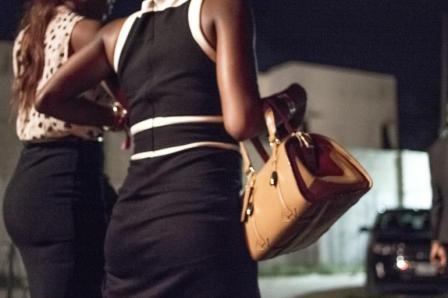Life in Nigeria, one of the world’s most anti-gay nations, is a daily struggle for Adeola (not his real name), a closeted, working-class homosexual man living on the outskirts of Abuja, the nation’s small, central capital.
Adeola has been called names, insulted and ostracized over assumptions about his sexuality, so he shields his true self in fear that coming out would only attract more intense abuse.
Meanwhile, some young, wealthy gay Nigerians who spend most of their time in the louche, Westernized Victoria Island section of Lagos — the massive, quickly modernizing megalopolis on Nigeria’s southwestern coast — are able to live a quasi-open life despite the virulent homophobia that rules in much of the rest of the country.
For Adeola, a portly man in his thirties who earns a modest living as a cook at a catering company in Abuja, that life of openness is difficult to imagine.
Adeola said he worries about discrimination every time he walks out the door, especially in light of a law passed this year that, should it be signed by President Goodluck Jonathan, would make the sheer act of being gay punishable by up to 14 years in prison.
“It’s extremely difficult because everyone sees you as abnormal,” Adeola said while running errands at a busy Abuja shopping center. “Everything has to be in secret.”
Adeola’s fears are supported by statistical evidence: A study of 39 nations published by the Pew Research Center in June deemed Nigeria the least-accepting nation of the lot for gays, with 98 percent of survey respondents saying society should not accept homosexuality, inching out ultraconservative Jordan by a single percentage point.
An Accepting Bubble
Six upper-class gay professionals who met with the International Business Times at a Victoria Island restaurant last week say that because they mostly stay within that neighborhood’s fairly tolerant bubble, they are largely able to avoid Adeola’s constant state of fear. Still, they, like everyone else interviewed for this story, asked to be assigned pseudonyms because of the harsh penalties that can result from being identified as gay in the press.
“I’ve been very fortunate in Lagos because I’ve been around people who understand these things, who are accommodating, who understand, are very enlightened and don’t judge,” said Olawale, the owner of a high-end baking company, between sips of his Long Island iced tea.
Fatima, a Lagos content manager, has had a somewhat different experience. Although she grew up in the sprawling city, she attended private school on Victoria Island and was isolated from the poverty and chaos of the mainland during her youth. But after attending a London university, she returned to her home country and said she was shocked when she visited a friend’s home on Lagos mainland for the first time. It was her first exposure to what locals call “the real Nigeria.”
Fatima is not gay per se — she describes her sexuality as “fluid” and said she is open to relationships with men or women — but she mostly dates women. She said her first real lesbian experience was when she was 18 and in London, where she fell in love with a Trinidadian girl: “great skin, great hair, very pretty, great cook.”
The relationship didn’t work out, but it was obvious to her then that her sexuality didn’t fit neatly in the “straight” box. Over the years, she has repeatedly attempted to talk to her parents and siblings about her relationships, but found them unwilling to have an open conversation about her orientation or her love life.
“I think it’s easy hanging out with your friends, but it’s more difficult with your family. I’m not really close to my family because of it,” she said. “Not because they’ve done anything mean to me, but because I fear that they would. I’ve had friends whose parents kicked them out or disowned them because they told them they were gay.”
Criminalizing Homosexuality
Being gay in Nigeria has long meant hiding in the shadows of society, but fear and anxiety among most members of the nation’s gay community have grown markedly since May 30, when the Nigerian Senate passed a bill making the simple act of being homosexual a crime punishable by as long as 14 years in prison.
Jonathan has not yet signed or vetoed the bill — which was previously passed by the Nigerian House of Representatives — nor has he sent a clear signal of which side he will eventually take on the controversial measure.
The bill, coupled with legal restrictions on gay marriage, is actually lenient compared with the situation faced by gays in the Muslim-dominated north of the nation, where Shariah Islamic law makes homosexuality a capital offense punishable in some areas by stoning to death.
Even though the measure is not yet officially on the books, it has already had a chilling effect on gay life in Nigeria, according to Aisha, a lesbian friend of Fatima’s.
“Prior to the law, there was a sort of ‘Don’t ask, don’t tell’ thing going on,” Aisha said. “It was frowned upon — just don’t do anything in anyone’s face.” But now, she said, there is a widely held, albeit premature, belief that “it’s illegal and it carries a sentence” of more than a dozen years behind bars, which further intimidates Nigeria’s gay population.
Although Fatima considers Abuja to be “like gay central of Nigeria,” the place she said she would go to “hook up with a girl, several girls, in one weekend,” that side of gay life isn’t accessible to many homosexual residents of the capital who aren’t as well-heeled as her.
Read more on IBTimes

